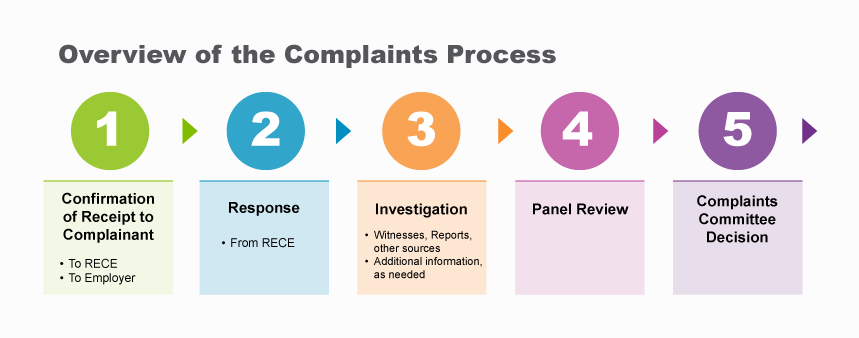The vast majority of RECEs are trusted, accountable professionals who practise the profession in a manner that supports the development and well-being of children. However, as a regulatory body that establishes and enforces ethical and professional standards to protect the public interest, the College has a responsibility set out in the ECE Act to have a process to address the behaviour of the small number of RECEs whose practice falls short of professional standards.
In this first article in a series demystifying complaints, we introduce you to the types of complaints the College receives; walk you through the process of how they’re addressed; and help you understand your rights as a member.
Complaints: Why we have them and how we receive them
All regulated professions have an accountability mechanism which protects the public, upholds the reputation of the profession, and supports high standards of practice.
In addition to addressing issues related to the practice of individual RECEs, the complaints process provides data that helps the College identify emerging or recurring issues affecting the profession.
Complaints regarding an RECE can come to the College a few different ways:
- Member of the Public (Public Complaint)– a parent, family member, colleague or other member of the public may file a written complaint with the College about the action(s) or behaviour of an RECE.
- Mandatory Employer Report (MER)– Employers are required to report to the College when they suspend, impose restrictions on an RECE’s duties or terminate an RECE for reasons of professional misconduct. They are also required to report when they become aware that an employee who is an RECE has been charged with or convicted of certain criminal offences or has engaged in conduct that should be reviewed by the College. Employers complete a detailed report which they send to the College.
- Information from another organization (Registrar’s Complaints)– The College can receive information from other sources, such as a Children’s Aid Society, local police units or the Ministry of Education. If there are grounds to believe an RECE may have committed an act of professional misconduct, the College Registrar will file a complaint.
In 2023, the College opened 691 new complaints, of which 51% of the cases came from mandatory employer reports, 41% from information from another organization and 8% from public complaints.
The Complaints Process, Step-by-Step
When a complaint is received by the College, the RECE will receive a copy of the complaint. The RECE will be given at least 60 days to provide a written response to the College.
College investigators conduct a neutral and objective investigation, gathering relevant information relating to the concerns raised. The RECE then has an additional opportunity to respond to the findings of the investigation.
Once the investigation is completed, all the information gathered by the College investigator is provided to the College’s Complaints Committee for their review and careful consideration. They take into account the seriousness of the concerns raised, the member’s response and any prior College decision history involving the RECE.
The Complaints Committee does not hold hearings or hear evidence from witnesses.
The Complaints Committee process is confidential in accordance with the ECE Act. Only decisions involving a referral to the Discipline Committee form part of the publicly available information on the public register.
Note that not all complaints require investigation and go to the Complaints Commitee. For complaints arising from Mandatory Employer Reports or Registrar’s complaints, some may be addressed through informal resolutions or closed without the need for further investigation, based on the seriousness of the complaint and the risk level to the public. (We will explore the processes for low -and high-risk cases in subsequent articles in this series.)
What are the possible outcomes of a complaint that goes to the Complaints Committee?
The ECE Act sets out the types of decisions the Complaints Committee can make.
- Referral for a hearing
In higher-risk cases involving more serious concerns, the matter may be referred to the College’s Discipline or Fitness to Practise Committee for a hearing. We will have a deeper dive into the College’s Committees including the Complaints Commitee in future articles.
- Verbal caution
A verbal caution, the most common outcome in moderate-risk cases, is educational rather than punitive. A member of the Complaints Committee will explain the concerns about the RECE’s conduct or practice and include reminders of their professional obligations and recommendations to help the RECE improve their practice and avoid similar concerns in the future.
- Remedial education
In low to moderate risk cases, the Committee can require the RECE to complete a Specified Continuing Education or Remedial Program (“SCERP”) to enhance their professional practice
- No further action
For low-risk complaints with no public protection concerns, the Committee may decide to take no further action
The Committee must provide written reasons for its decision to the RECE, the complainant or reporting employer, and the current employer.
What are your rights if there’s a complaint against you?
When an RECE is notified of a complaint against them, it can be stressful and trigger a range of emotions such as shock, anger, fear, and a need to defend themselves. These emotions can be overwhelming. Knowing that you have procedural rights may help reduce this stress.
You have the right to:
- An impartial investigation: No person investigating the complaint has any involvement in the complaint. They are neutral fact finders and seek to only gather the relevant information.
- Receive the results of the investigation: You will be provided with the results of the investigation prior to a decision being made.
- Provide a response to the complaint: You have the opportunity to provide a written response as part of the investigation, both at the outset and completion of an investigation. This is your chance to offer your side of the story.
- Have the investigation completed within a reasonable amount time: The College endeavours to complete the investigation within a reasonable time period and will provide updates on the status of the investigation to both the complainant and the RECE involved in the complaint.
- Seek legal assistance. You may wish to retain legal counsel to assist you and provide advice on how to respond to the complaint. The College investigator or College staff cannot provide you with advice on how best to respond to a complaint.
- A Complaints Committee free from conflict of interest: Consideration of the investigation results by a Complaints Committee comprised of practising RECEs and members of the public who are free from any conflict of interest.
- A written decision: A formal, written decision of the Complaints Committee so that you know why the Committee reached their decision.
One way the College protects the public is by proactively supporting RECEs in their practice with a variety of tools and resources, to help prevent problems before they arise.
Look out for future articles in this series.


